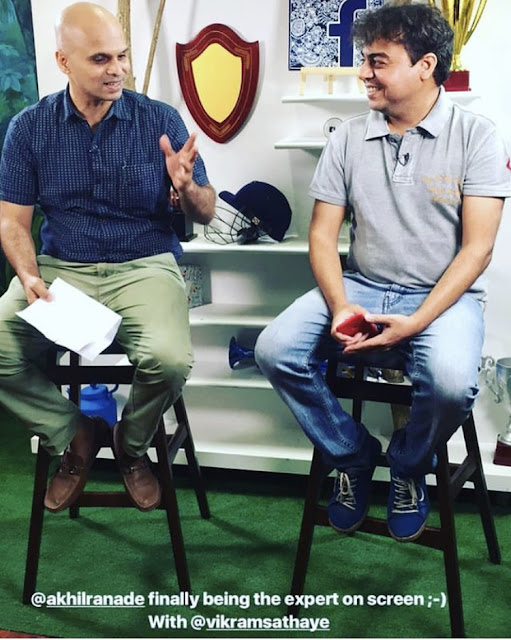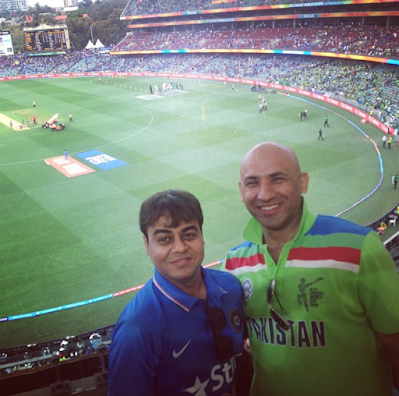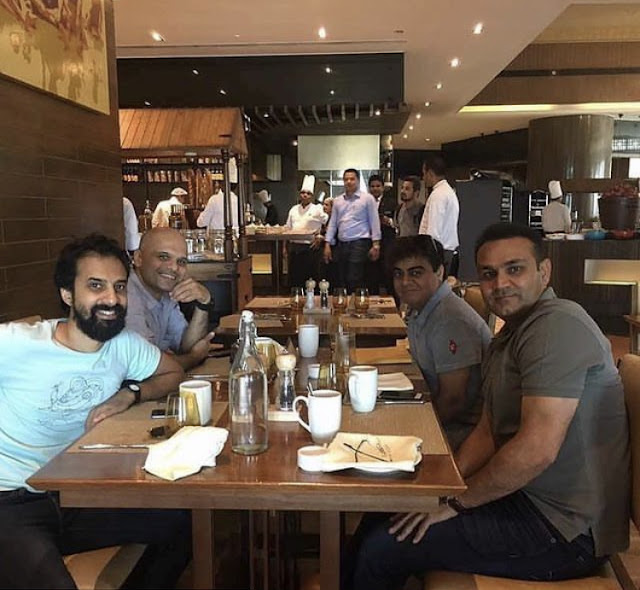Looking back, which are the fondest memories of your formative years?
I was born and bought up in Santacruz west, Mumbai. I had a very happy childhood surrounded by a loving family, helpful neighbours and a large set of friends, A lot of my time, as you can imagine from the vocation of my choice, was spent in playing sport. I was a very good student until the 8thstandard and enjoyed all subjects except science. I did not particularly enjoy going to school though, I think I had the best time playing sports with my friends in our housing complex.
We are a simple, Maharashtrian family; my dad worked in a bank all his working career, but he was also involved in a lot of social work. Mom quit her job when I was about 7, so she was a big support system both for my studies and sport. Both my parents were socially well connected and we always had many fruitful interactions with family, neighbours and friends. I remember my first sporting rivalry featured my elder brother as the opponent. Like every other family, this involved many playful fights and arguments, always a formidable challenge I must say given that he was older and stronger.
My school was not such a fancy one, and we did not have much support for sports in the school. Though I was the school cricket team captain, I hardly got any coaching, neither facilities nor match practice to be able to make any significant progress in school cricket. Precisely why my fondest memories are invariably the magical moments I spent playing with friends in my society. Compared to other housing complexes in Mumbai, we had lavish spaces in our complex to play sport and thankfully I made a lot of like-minded friends who relished playing sports.
Was it cricket by default?
Yes, cricket was always the number 1 sport, we also played tennis regularly with a net made up of a rope held by bicycles on either end (nevertheless with top class racquets which a friend’s dad owned, a luxury few could afford at that time. Those racquets were magnificent and I can still visualize them in my hand.) Plus I had my own duels in my mind. Even to this day, I can’t resist a hearty laugh thinking of how I often played tennis against a wall with a badminton racquet, pretending myself to be Boris Becker! We even hit upon an innovative method to play golf! I was excellent in table tennis and played it very seriously and at a good competitive level during my school days.
Boris Becker was my first sporting hero, though I do not remember watching him win Wimbledon in 85,86. I still idolized him and followed his matches whenever possible. Sunil Gavaskar was another hero of my formative years, but he retired when I was too young. I eventually grew older with Sachin’s emergence as a cricketer and you could never miss on his exploits, could you?
When did you turn to sport as a career option?
I never enjoyed my B.Com stint academically. It happened more due to lack of ample choices. I did want to be a Chartered Accountant at one time and spent a couple of years giving it my best shot, but I could not come to terms with its monotony, so I started exploring other options. As sports was always an interest area, I started researching a little more about the options to pursue it as a full time career; in fact, I also researched about going overseas to study sports, but somehow I wasn’t convinced enough to pursue a full time sports management degree. I thought an MBA was a more prudent option to get a job in marketing.
Can you elaborate on the MET league of colleges, its structure and curriculum?
MET was one of the happiest phases of my life. The college itself was not among the best B-schools in India but I met some fantastic people there – professors and friends who allowed me the freedom to experiment with what I felt like pursuing. I always wanted to do things a little differently than normal, and I discovered that such an aspect is actually admired / respected which had never happened in my previous academic institutions. We had a professor, an alumni of IIM-A, Professor Venkat, who went out of his way to give me as much actionable information as I needed. More than studying the college curriculum, I was delving into the depths of areas of my interest and imagination.
Thanks to him, I got access to a lot of reading material, marketing case studies from international schools and interactions with umpteen folks working in the industry. He also got on board a couple of his IIM-A batchmates who introduced an amazing way of teaching which I really enjoyed. I relished my interactions with Professor Vikram Sampat, his structured approach to learning was something I really took to. Someday, I will certainly do a comprehensive video about my MET days, there’s so much that I learned outside the books. The network and camaraderie I discovered in that institute went a long way in shaping my career path. Also our director of the institute Mr Vijay Page was always accessible to students for discussions on various themes and topics. It was great fun and learning together.
You made your career debut with O & M in the sports space. What did the job entail?
It was a dream job! We were supposed to help brands frame and execute their sports strategies! It looked awesome on the face of it, but in hindsight an ad agency trying to run a business model into sports does not work in India. Results take time and the investment called for is not something the ad agencies are willing to risk. We were a 2 member team with not much support, which meant we had to brave umpteen battles. We did not have much success there, so we had to move out in due course.
Your ad and media stints comprise all the big names of the time like O&M, Mudra and the like. How was the experience?
As mentioned earlier, we tried to run a sports marketing business in an ad agency but the agencies do not have the mindset to build this business. It was largely a struggle for us to get some impactful business going. Another 2 member team meant we were like all-rounders trying to do everything! The going got tougher and tougher and we managed to stay put, thanks to a supportive group of friends in other departments. My stint highlights include working with Liverpool and Arsenal coaches, doing my first cricket deal with Mohammad Azharuddin, excelling at making effective, persuasive presentation decks, learning how a 360 activation program works for brands, doing my first IPL sponsorship deal, almost signing up the Indian Boxing Federation in a large exclusive deal. Given the hardships of the process, these breakthroughs were fulfilling no doubt.
en route MCG Visit
When did you switch to Puma?
The Puma role happened because of someone I met at during my Mudra days. My friend Bhavisha Dave had come to work with us at Mudra for a few days to see how and what we do in the sports business. She had finished her studies and was working in the marketing team at Puma. When the cricket category role opened up at Puma she had recommended my name and got me the meeting with my future boss at Puma Cricket.
With Bhavisha and her husband Dhruv
The role was great! I got exposure across functions which I had never been a part of. The sourcing person at Puma Cricket was one of the best in India and I learnt a lot with him about how the cricket retail business operates. The vendors we worked with were also great and helped us in getting the global production for cricket together, which was amazing.
I got exposure to both the wholesale and retail business for Puma Cricket; besides, I could work closely with the excellent marketing team to curate some cool campaigns. Unfortunately, the chunk of business that cricket generates is too little for a giant company, so the opportunity for growth and recognition were always going to be limited. I hence decided to move on. I distinctly remember the day I told my boss of my exit plans, I had mentally decided then and there that I would go watch the next 50-over cricket world cup. This was a good 2 years prior to the announcement of the World Cup schedule!
After a successful and eventful track record, why and when did the offbeat thought of starting your own venture cross your mind?
I wasn’t truly happy in the jobs I was doing or those available in the market. I didn’t want to take up another job after Puma just to keep the salary coming in. I was confident about finding some or the other work that could help me sustain. A deep conversation with one of my close friends Sharan Sood provided the trigger and culminated into the turning point (close to a decade has passed since but he still remembers all the options we had contemplated on) One door opened and led to a foot in another door, and we moved with the flow. Thankfully it has been a good ride so far.
What would you rate as your most cherished achievements as the founder of Sports Boutique?
Cherished achievements are the relationships I have built with people. There are folks who have gone out of their way to work without money for me which is something you cannot buy. Having some competent and conscientious people working with you is amazing. My friend Vikram Sathaye has been a constant source of encouragement since my MBA days and the work we have done together in the events and content space is epic and something we are immensely proud of. We did 4 seasons of a show called What The Duck where we lived every cricket fan’s dream!
Virender Sehwag is someone I am always thankful to. He has been amazingly supportive in all initiatives that Vikram and I tried in the content and event space and we love working with him! Getting him and Tendulkar together in an episode of WTD was a glittering highlight for us. Rahul Dravid and Steve Waugh are the cricketers I admire the most. I relate a lot to their personality – quiet team men who are not afraid of doing the difficult tasks. Ajinkya Rahane is very similar to both these gentlemen, and who I enjoy working with. He is extremely easy to get along with and a thorough professional to work with.
How do you look at the evolution of competitive cricket in India? What in your reckoning is the future of test cricket?
Cricket has moved on rapidly since India last won the 50 overs WC in 2011. Franchisee cricket is the one which is growing the fastest and generating the most revenue for the sport. I hope test cricket survives – maybe only 4 or 5 teams might be able to afford playing test matches in the next few years unless the ICC can find a way to monetize it for teams like South Africa / Sri Lanka. IPL becoming the tentpole property for brands, the BCCI will do their best to keep making it better. The opportunity to scale up IPL by introducing new teams will be tempting for them and exciting for the industry. Hopefully more broadcasters / OTT platforms can continue to bid for rights, and it does not end up as a 1-2 channel game.












